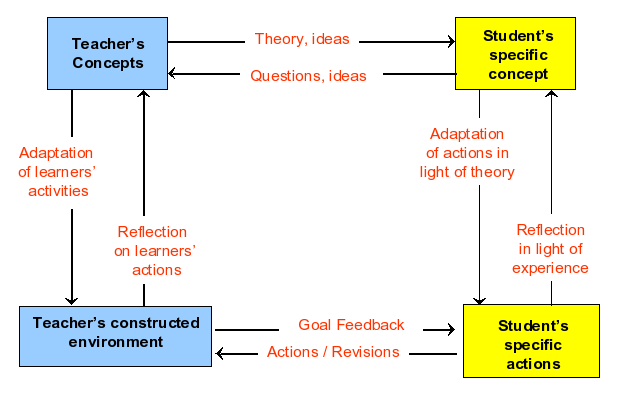Laurillard conversational framework
Jump to navigation
Jump to search
Definition
Laurillard (1993,2002) claims that there are four main aspects of the teaching-learning process and that different educational media can be analyzed (and used) in terms of these dimensions.
This framework can be considered both learning theory and a practical framework for designing educational environments. Higher education, according to Laurrillard is much about acquiring "ways of seeing the world". Associated pedagogic strategy has to consider different forms of communication: Discussion, adaptation, interaction, reflection.
Design of learning environments
Each (larger) pedagogical scenario should include all four kinds of activities (communication forms)
- (1) Discussion (delivery)
- Teachers' and learners' conception should be mututally accessible
- Both should agree on learning objectives
- (2) Adaptation
- Teacher must adapt objectives with regards to existing conceptions
- Learners must integrate feedback and link it to his own conceptions
- (3) Interaction
- Teacher must "adapt to world", i.e. create an environment adapted to the learning task given to the learner
- Teacher must focus on support for task and give appropriate feedback to the learner.
- (4) Reflection
- Teacher should support the learner to revise his conceptions and to adapt the task to learning needs
- Learners should reflect with all stages of the learning process (initial concepts, tasks, objectives, feedback, ...)
== Media and activities
Links
- A conversational framework for Instruction (nice chart)
- Diana Laurillard's conversational model Part of a GLOW text on What educational theories apply to web-based learning?
References
- Atherton J S (2005) Learning and Teaching: Conversational learning theory; Pask and Laurillard [On-line] UK: Available: http://www.learningandteaching.info/learning/pask.htm Accessed: 12 September 2006
- Laurillard, D. M. (1993). Rethinking University Teaching: A Framework for the Effective Use of Educational Technology. Routledge, London.
- Laurillard, D. (2002). Rethinking University Teaching. A conversational framework for the effective use of learning technologies. London: Routledge
